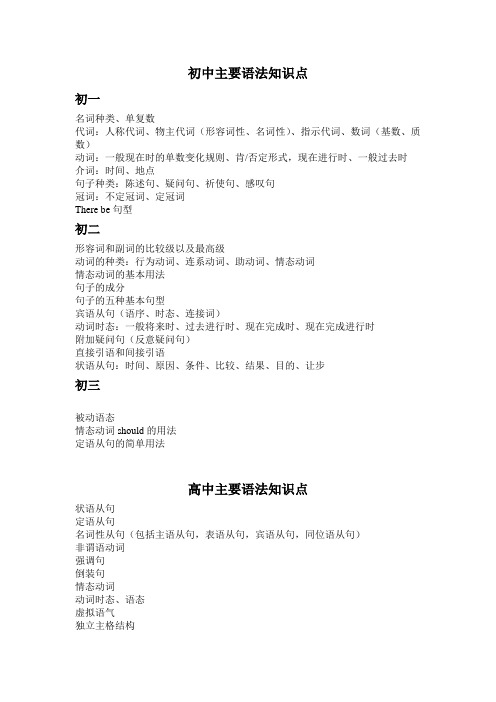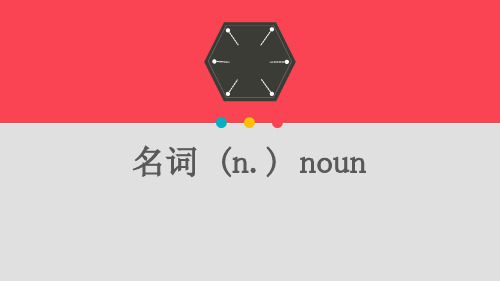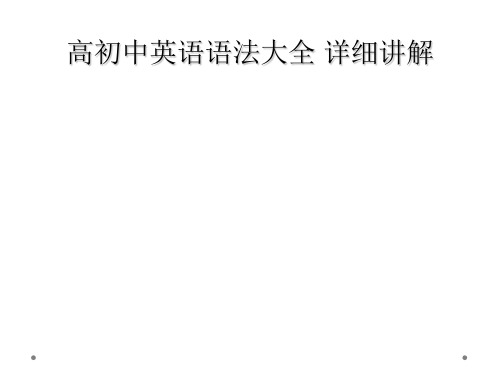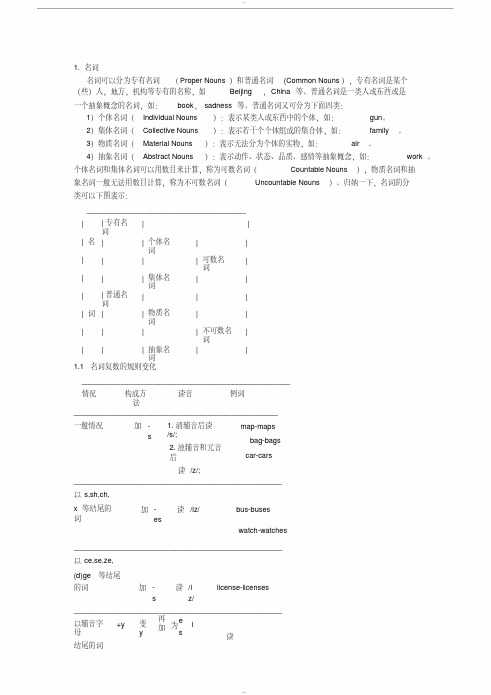初中高中语法词汇详解
- 格式:doc
- 大小:53.00 KB
- 文档页数:7

初中主要语法知识点
初一
名词种类、单复数
代词:人称代词、物主代词(形容词性、名词性)、指示代词、数词(基数、质数)
动词:一般现在时的单数变化规则、肯/否定形式,现在进行时、一般过去时
介词:时间、地点
句子种类:陈述句、疑问句、祈使句、感叹句
冠词:不定冠词、定冠词
There be句型
初二
形容词和副词的比较级以及最高级
动词的种类:行为动词、连系动词、助动词、情态动词
情态动词的基本用法
句子的成分
句子的五种基本句型
宾语从句(语序、时态、连接词)
动词时态:一般将来时、过去进行时、现在完成时、现在完成进行时
附加疑问句(反意疑问句)
直接引语和间接引语
状语从句:时间、原因、条件、比较、结果、目的、让步
初三
被动语态
情态动词should的用法
定语从句的简单用法
高中主要语法知识点
状语从句
定语从句
名词性从句(包括主语从句,表语从句,宾语从句,同位语从句)
非谓语动词
强调句
倒装句
情态动词
动词时态、语态
虚拟语气
独立主格结构。




初高中英语知识点汇总Introduction英语作为国际通用语言,在中小学教育中起着重要的作用。
初高中阶段的英语学习涵盖了广泛的知识点,包括词汇、语法、阅读理解、写作等。
本文将对初高中英语的知识点进行汇总和概述。
一、词汇知识点1. 名词:名词是英语语法中的基本词类之一,用来指代人、事物、地点等。
名词还可分为可数名词和不可数名词,可数名词需要加上数量词来表示具体的数量。
2. 动词:动词是句子中最重要的成分之一,表示人或事物的行为、状态或存在。
动词的时态、语态和语气变化多样,需要根据语境和语法规则进行变换。
3. 形容词和副词:形容词用来修饰名词,描述人或事物的特征。
副词用来修饰动词、形容词或其他副词,描述动作的方式、程度等。
4. 介词:介词用来表示人或事物的位置、方向、时间、方式等关系。
介词通常与名词、代词等搭配使用,构成介词短语。
5. 冠词:冠词是表示范围的词汇,在句子中用于限定名词的范围。
英语中有三种冠词,分别是定冠词“the”和不定冠词“a/an”。
二、语法知识点1. 时态:时态是动词的一种变化形式,用来表示动作或状态发生的时间。
常见的时态有一般现在时、一般过去时、一般将来时等。
2. 从句:从句是可以独立存在,同时也可以作为主句或宾语从句的一种句子结构。
从句包括名词性从句、定语从句和状语从句等。
3. 句型转换:英语中有多种句型变换的规则,例如变换句子的语态、改变句子的结构等。
掌握这些句型变化规则有助于提高句子的表达能力。
4. 并列连词:并列连词用来连接两个相同类型的句子、词语或短语,使它们具有并列关系。
常见的并列连词有and、but、or等。
5. 语态:英语中的动词有主动语态和被动语态之分。
被动语态用于强调动作的受事者而非执行者。
三、阅读理解知识点1. 主旨大意:阅读理解题目常常要求判断文章的主旨大意,即文章的主要观点或重要信息。
读者需要通过阅读文章的内容和语境进行推断和归纳。
2. 细节理解:阅读理解题目中常常出现问题要求读者根据文章提供的细节进行理解和判断。

英语初高中语法知识点重点总结一、名词名词是英语中最基本的词类之一,用来表示人、事物、地点、抽象概念等。
1. 可数名词和不可数名词可数名词可以用来表示可以分为个体的事物,可以用单数和复数形式。
不可数名词表示不可分为个体的事物,只有单数形式。
例句:- There are three books on the table. (可数名词)- I have some milk in the fridge. (不可数名词)2. 可数名词的复数形式大多数可数名词的复数形式是在词尾加-s,但也有一些特殊情况需要记住,如:man-men, woman-women, child-children等。
3. 不可数名词的量的表达不可数名词表示整体概念,不能与数词直接连用,需要通过使用量词或容器来表示数量。
例句:- I would like a cup of coffee. (使用容器表示数量)- Could you pass me some sugar? (使用量词表示数量)二、冠词冠词是放在名词前面的词,用来限定名词的范围。
1. 定冠词和不定冠词定冠词"the"用来特指某个人或事物,而不定冠词"a/an"用来泛指某个人或事物。
例句:- The book on the table is mine. (定冠词)- I want to buy a book. (不定冠词)2. 使用冠词的特殊情况- 在表示一类人或事物的概念时,可用不定冠词或零冠词。
例句:A dog is a loyal animal. (不定冠词)- 在表示乐器、餐馆、酒店等场所时,通常使用定冠词。
例句:I play the piano. (定冠词)三、动词动词是表示动作或状态的词。
1. 时态英语中的时态包括一般现在时、一般过去时、一般将来时等,用来表示动作或状态发生的时间。
例句:- He goes to school every day. (一般现在时)- She studied English yesterday. (一般过去时)- We will visit our grandparents next week. (一般将来时)2. 动词的时态和语态动词的时态和语态可以通过助动词和动词的变化来表示。
初高中英语语法基础知识大全《初高中英语语法基础知识大全》一、语法分类1. 词法:(1)单词类:名词、代词、形容词、副词、数词、动词、介词、连词等。
(2)句子类:定语从句、状语从句、名词性从句、主谓宾、并列句等。
2. 名词(1)可数名词:表示可以分开计数的人或事物,如:book(书)、pen(钢笔)、desk(桌子)等。
(2)不可数名词:表示无法分开计数的人或事物,如:water (水)、tea(茶)、music(音乐)等。
3. 形容词(1)比较等级:表示两种或两种以上的比较程度,如:taller (更高的)、stronger(更强壮的)、better(更好的)等。
(2)最高级:表示三种或三种以上的比较程度,如:tallest (最高的)、strongest(最强壮的)、best(最好的)等。
4. 动词(1)一般现在时:表示经常性或习惯性的动作,如:do、go、study、read等。
(2)一般过去时:表示过去曾经发生过的动作,如:did、went、studied、read等。
(3)现在分词:表示与主语同时发生的动作,如:running(跑)、studying(学习)、working(工作)等。
(4)过去分词:表示过去曾经发生过的动作,如:run(跑)、studied(学习)、worked(工作)等。
5. 介词(1)位置介词:表示在某一位置的方位,如:in(在……里)、on(在……上)、at(在……旁)等。
(2)时间介词:表示与时间有关的词,如:in(在……时候)、from(从……开始)、before(在……之前)等。
二、语法使用1. 冠词(1)定冠词:用在名词前,表示特指某一个人或物,如:the book (这本书)、the pen(这支钢笔)等。
(2)不定冠词:用在名词前,表示一般概念,如:a book(一本书)、an apple(一个苹果)等。
2. 助动词(1)be动词:表示状态、特征、身份等,如:am(我是)、is (是)、are(们是)等。
虚拟语气分三种情况来掌握:1、虚拟条件句。
2、名词性虚拟语气。
3、虚拟语气的其他用语。
一、虚拟条件句:条件状语从句是非真实情况,在这种情况下要用虚拟语气。
1、条件从句与现在事实不一致,其句型为:If 主语+过去时,主语+should(could, would, 或might)+动词原形,如:If I were you, I would study hard.If it rained, I would not be here now.2、条件从句与过去事实不一致,句型为:If 主语+had+过去分词,主语+should(could, would, 或might)+have+过去分词,如:If the doctor had come last night, the boy would have saved.If I had not studied hard, I would have failed in the exam last term.3、条件从句与将来事实不一致,句型为:If 主语+should(were to, 过去时)+do,主语+should(could...)+原形do,如:If it should rain tomorrow, we would stay at home.If I were to go to the moon one day, I could see it with my own eyes.If you missed the film to night, you would feel sorry.注意问题:1、If条件句中绝对不可出现"would"。
2、根据句中的时间状语,有时可能出现“混合虚拟”的情况,即主句可能是现在的情况,条件句也许是发生在过去的情况,但都是遵守上述句型。
3、在条件句中如果出现were, had, should可省去if,将主语与这些词倒装,例如:Had the doctor come last night, the boy would have saved.Were I to go to the moon one day, I would see it with my own eyes.Should it rain tomorrow, we would stay at home.二、名词性虚拟语气:在表示命令、建议要求、惊叹时的名词性从句中需用虚拟语气,基本句型:主语+(should)+动词原形,如:Mother insisted that John go to bed at 9 o'clock.(宾语从句)We suggested that the meeting should not be held.It was required that the crops should be harvested at once.(主语从句)The suggestion that he be invited was rejected.(同位语从句)That is their demand that their wages be increased.(表语从句)注意:在这种句子中绝不出现"would""must""could"等。
三、虚拟语气在一些特殊词中的使用或含蓄条件句:1、wish后的宾语从句:与现在愿望不一致——主语+过去时:I wish I were you.与过去愿望不一致——主语+had+过去分词:I wish I had visited the white House when I was in the states.与未来愿望不一致——主语+would(could)+原形:I wish I could meet you tomorrow at the party.2、It's time句型:当It's time后用that从句时应该为“主语+should+原形”或“主语+过去时”,例如:It's time that you went to school. 或It's time that you should go to school.3、If only引起的感叹句相当于“How I wish+宾语从句”:If only he could come! 他要能来就好了。
If only I had known the answer! 我要早知答案就好了。
4、would rather, as if(though)引导的句子也需使用虚拟,表示过去的情况用过去完成时,表示现在与将来的情况用过去时,如:I'd rather you posted the letter right away.I'd rather you had returned the book yesterday.She loves the children as if they were hers.Alan talked about Rome as if he had been there.5、without, but, but for, otherwise引起的短语或句子常暗含着含蓄条件:Without you, I would never know him.But for your cooperation, we wouldn't have done the work so well. = If it were not for your cooperation, we we wouldn't have done the work so well.(注:without / but for... = If it was not for.../ If it hadn't been for...)But that she was afraid, she would have said no.I would be most glad to help you, but I' am busy now.I am busy now; otherwise I would do you the favor!专项训练1、It is important that a college student ______ a foreign language.A.will master B.master C.masters D.would master2、It is strange that she ______ without saying a word.A.should have gone out B.went C.should go out D.goes out3、If my lawyer ______ here last Saturday, he ______ me from going. A.had been, would have prevented B.had been, would prevent C.were, would prevent D.were, would have prevent4、——“He is a brave man.”——“Yes, I wish I ______ his courage.”A.have B.had C.will have D.may have5、If it ______ rain, the crops would be saved.A.should B.will C.is going to D.was to6、He ordered that the medicine ______ by a special plane.A.was sent B.would be sent C.should send D.be sent7、If you ______ the medicine, you ______ better now.A.took, would feel B.had taken, felt C.had taken, would feel D.took, would have felt8、She is my sister, but she often acts as if ______ my mother.A.is B.was C.were D.had been9、I went to bed early last night, but I wish I ______ so.A.didn’t do B.hadn’t done C.haven’t done D.couldn’t do10、I’d rather he ______ tomorrow afternoon.A.will come B.comes C.coming D.came(后设答案,大家不要偷看哦~(*^__^*) 嘻嘻……)KEYS1、B2、A3、A4、B5、A6、D7、C8、C9、B 10、D16.7 比较if only与only ifonly if表示"只有";if only则表示"如果……就好了"。
If only也可用于陈述语气。
I wake up only if the alarm clock rings. 只有闹钟响了,我才会醒。
If only the alarm clock had rung.当时闹钟响了,就好了。
If only he comes early.但愿他早点回来。
16.9 need "不必做"和"本不该做"didn't need to do表示:过去不必做某事, 事实上也没做。
.needn't have done表示:过去不必做某事, 但事实上做了。
John went to the station with the car to meet Mary, so she didn't need to walk back home.约翰开车去车站接玛丽,所以她不必步行回家了。
John went to the station with the car to meet Mary, so she needn't have walked back home.约翰开车去车站接玛丽,所以她本不必步行回家了。
(Mary步行回家,没有遇上John的车。
)典型例题There was plenty of time. She ___.A. mustn't have hurriedB. couldn't have hurriedC. must not hurryD. needn't havehurried答案D。